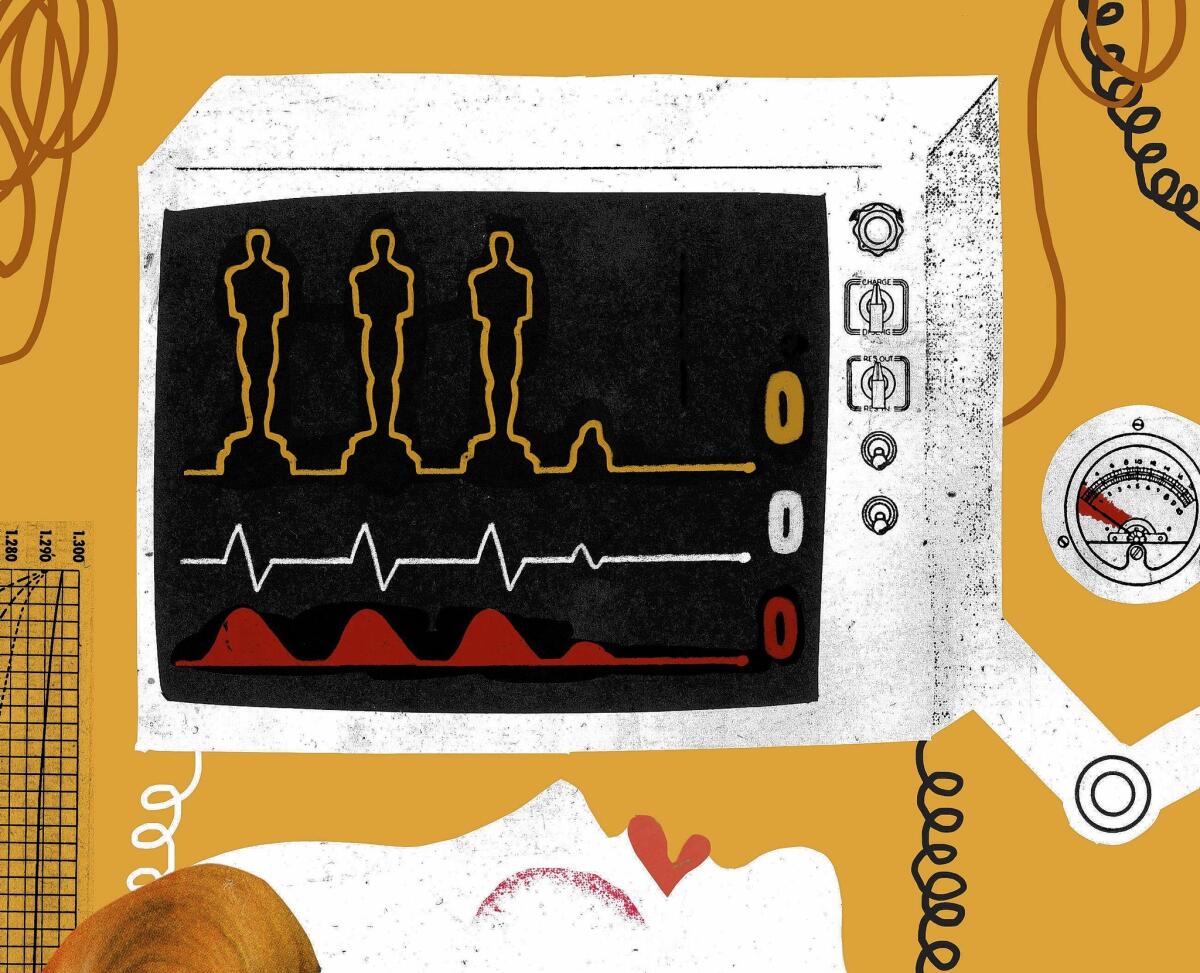Playing illness or frailty: Does it make award chances stronger?

For many actors, Academy Award-nominated performances are to die for.
Or, rather, if you play a character who dies — or who’s dealing with illness or disability — your chances of earning a nomination and even the win go up significantly.
Of the last 20 lead actor Oscar races, for example, 40% of wins have gone to actors who played characters who died on screen, an additional 25% of wins went to actors playing ill or mentally ill characters. In the last 20 years of lead actress races, 30% of wins were for playing characters who died or were ill. The numbers are inexplicably far higher among supporting actor wins (55%) and far lower among supporting actresses (15%).
This year, the actors who have earned nominations for portraying variations of the afflicted and ailing include Cate Blanchett for her descent into madness in “Blue Jasmine,” Jared Leto and Matthew McConaughey as characters dealing with AIDS in “Dallas Buyers Club,” Meryl Streep as a cancer-riddled matriarch in “August: Osage County” and Bruce Dern for playing a frail patriarch perhaps enduring the early signs of dementia in “Nebraska.”
Do these performances draw praise because they speak to universal fears of mortality? Do the older demographics of the film academy’s voters mean they take these themes to heart?
It could be. Or it could simply be that these are the performances of a lifetime for the nominees and winners precisely because they often take a lifetime of experience to perform. Katey Rich, editor of Vanity Fair’s Hollywood, notes that while these parts can veer into sentiment, they also can lead to great work.
“There’s definitely a heartstring-tugging factor to these roles, but also they can bring out some phenomenal acting. For all the clichés about deathbed scenes, they can be incredibly powerful — think Jared Leto in this year’s ‘Dallas Buyers Club’ — or revelatory. Playing a character facing death can allow an actor to stretch significantly; it can veer easily into histrionics, but when it works, it’s attention-grabbing and powerful.”
PHOTOS: Extreme celebrity weight transformations for roles
Though Dern found similarities between himself and his character to draw on, he used the hardships of Woody Grant’s back story to shape his character’s condition. “Bruce Dern is, many days a week, a rather irascible human being, but I think Woody is irascible not by choice but [from] 77 years of having to play the game of life every day, and he’s suffered the slings and arrows and the medical stuff — and now the mental stuff as well.”
To Rich, the opportunities for showy scenes while playing ill or dying characters are countered by a few truly moving performances in those situations. “Think of Emmanuelle Riva in ‘Amour’ [an Oscar nominee last year] — that role is chock-full of incredible challenges, but the most powerful moments in that film are some of the quietest and most raw. The great actors seem to be the ones who know better than to fall into the trap of ‘more acting equals better acting.’”
In Oscar campaigning, conversations about the challenges inherent to roles tend to become part of the narrative of the nomination — and sometimes the win. Think of Tom Hanks losing weight for “Philadelphia” (just as McConaughey and Leto did for “Dallas Buyers Club”) or stories about James Franco being trapped in a small, cramped set for hours on end to play a stuck hiker on the edge of death in “127 Hours.”
BUZZMETER: Pundits’ Oscars 2014 picks
But that’s not always the case. Others playing the doomed and the dwindling have said that their efforts required far less work than you’d think. When Riva, who played a stroke victim in “Amour,” was asked if she was afraid of confronting the theme of mortality, she scoffed. “Why would I be afraid? This role presents the subject of the film that touches each of us, every human on the planet. As an actress, it’s so exciting to be engaged in a role like this.”
For his part, Dern noted how his own life helped him capture Woody’s incandescent frailty, especially in such scenes as the one in which Woody’s son and wife help him, carefully, up the stairs to the second floor of his childhood home. “I run, and I have run all my life. I’ve had every crippling, debilitating running injury you can, including a torn right quadriceps. … I don’t sit down and stand up well. And I sure as hell don’t go up and down stairs well.
“But if you look at football playoffs, and you look at the teams that get there, and you look at the guys that carry those teams — it’s the old veterans that get the younger ones stoked and fired up to play every single day, and all I tried to do was bring it every day, every day, all day. And as crippled and [messed] up as Woody is, he’s still standing.”
More to Read
Only good movies
Get the Indie Focus newsletter, Mark Olsen's weekly guide to the world of cinema.
You may occasionally receive promotional content from the Los Angeles Times.






